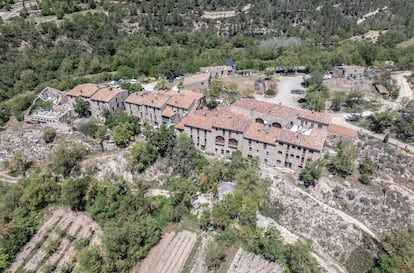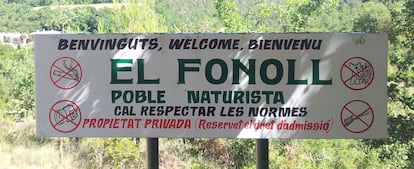El Fonoll, the medieval village in Spain where clothes are banned
Nestled in the Catalan mountains, this small naturist community was created in 1998 by an entrepreneurial couple on the ruins of a deserted town. Despite the strict rules, it attracts people from all over the world. ‘I will die in El Fonoll, naked but happy,’ says owner Emili Vives


There are many options to enjoy the summer. There are those who dislike to innovate and instead opt for an all-inclusive vacation at some beachfront resort. And then there are those who seek lesser-known and more alternative havens of peace. El Fonoll, a restored medieval village in the province of Tarragona, in Spain’s northeastern region of Catalonia, falls squarely within the latter category. Whether as a family, as a couple or alone, wearing clothes is prohibited here. The village, founded in the 14th century, has been converted into a community for those who want to experience harmony with the natural environment. There are campsites, hotels, rural homes, restaurants and many activities on hand, but there are also strict rules: taking photos is prohibited (unless you have consent); complete nudity is required (weather permitting), and respect must be shown for all ideologies. The list of rules goes on, on posters that are plastered everywhere. El Fonoll is a place where you cannot pretend to be what you are not.
It was in 1998 that this previously abandoned location became habitable again. The entrepreneurs Emili Vives and Núria Espinal, a married couple, built the naturist village from the ruins of the abandoned village — the last resident walked away in the 1950s. In a few years, it became a fresh-looking town with houses and everything necessary for living. “What brings me the most satisfaction is that, when I bought this, there was not a single tile left standing. There was nowhere to go. It was completely razed and abandoned,” explains Vives about how the village re-emerged from its ashes like “a Phoenix.” In a telephone conversation with EL PAÍS, the businessman gave details about the restoration process and the lifestyle of this peaceful community: “It took us eight years to have the entire exterior finished. It came out looking real pretty.” Although, he also confesses: “We don’t want any more tourists. We are fine the way we are now.” In 1998, they settled on the outskirts of town in a motorhome, and with the help of their children, they began to build what is today a refuge for naturists. “This meant I had to move into a motorhome in the winter, it was cold as hell,” he recalls.
Despite building the foundations of the community with very few difficulties, Vives did not have an easy time of it. He spent 150 million pesetas (about $980,000) out of his own pocket to recondition the spot. And as if that were not enough, he says, he has had judicial problems for more than a decade. His detractors call him “enlightened” and say he has executed building work without a license. He feels persecuted by the authorities, but has found solace in the streets of El Fonoll. The village even has its own currency. The community facilities are his, and the rules that he himself dictates must be complied with.
Basically, apart from the more than 30 rules to follow, the only major requirement in this corner of the world is to be a naturist. At least behind closed doors. “Naturism is a philosophy that seeks to live in harmony with nature. It is like a tree with many branches. It could be defined as a Buddhism of environmentalism. It’s a way of being. It’s not about being without clothes, which is also part of this type of tourism.” It could be viewed as a religion to which each of the visitors who set foot in El Fonoll pray, and whose 15 commandments — which can be read on their website — are inflexible. Although, as it is self-styled as a democratic community, suggestions can always be deposited in a public box. “I believe that this is a space of freedom, respect and good vibes. What we don’t let in is preachers or people who want to brainwash us. It is a space of respect for any ideology. Here, our only values are those of naturism,” the businessman states emphatically.

El Fonoll has 120 beds divided between apartments, cabins and a hostel. In addition, there is a campsite for motorhomes, which can also be used for long stays. To access El Fonoll and use the town’s facilities, you must purchase the access voucher: €7.50 for the day/night voucher (to which you must add the price of the accommodation). And for their most frequent visitors, they offer an annual rate of €51.
Among mountains of pine, elm and ash trees, “the lifestyle here is quite simple. My life, in fact, is quite austere. I try to eat everything I can get from my organic garden,” Vives confesses, always preaching that “simplicity is at the origin of happiness.” Peaceful coexistence is almost mandatory in this place. Both Vives and his volunteers organize activities from Monday to Sunday. There are walks and events to celebrate life. “We do cultural activities. We have a small cinema, a restaurant, a multipurpose nightclub that we also use for massage or yoga courses or workshops or whatever else we do around here,” says the owner. “On Sundays, there is paella for everyone.”
Probably, one of the most important rules, and at the same time, the most difficult to comply with, is: “In order to film or take photographs on the estate, authorization is required from the management and the people involved.” Privacy is one of the most precious assets of the El Fonoll community, which is sometimes endangered by the use of smartphones by visitors. Sometimes, the attempts of its owners to keep the village away from today’s world are threatened by technology. Even so, they assume that photographs have never been a problem for them: “They are prohibited. It is one of the rules that can be read on the sign at the entrance to the village. It is a matter of respect,” explains Vives. “When we make paella and we want to take a group photo because 70-80 people are together, we take it and that’s it.” He jokes: “I suggest to people who don’t want to be recognized in the picture, to turn their faces away.”
Paella (cada diumenge!) al Fonoll. Foto de Salvador Badiella
Publicada por El Fonoll poble naturista en Miércoles, 22 de junio de 2016
The visitors who come to El Fonoll are very diverse. “The people who come are those who have left their comfort zone. There are people of all kinds. But above all, they are very interesting people to meet and engage with. In short, we don’t get chusma (rabble) and people like that, fortunately.” Many foreigners make their way here: “The people who come the most are Dutch, Belgian, French, English and German. But people come from all over the world.” A curious case in point: “It is very interesting. A lot of people come from Iceland, even though we never advertise. We only have the one website.”
“From a financial point of view, I think this whole thing has been a failure,” said Vives in a 2010 interview with this newspaper. “I will die in El Fonoll, naked but happy.” Asked how he feels after 14 years, he confirms that he has no regrets: “As the militant that I assure you I am, I have always tried to disseminate and promote and explain and defend what naturism is all about, and I don’t I regret a thing.”
Sign up for our weekly newsletter to get more English-language news coverage from EL PAÍS USA Edition
Tu suscripción se está usando en otro dispositivo
¿Quieres añadir otro usuario a tu suscripción?
Si continúas leyendo en este dispositivo, no se podrá leer en el otro.
FlechaTu suscripción se está usando en otro dispositivo y solo puedes acceder a EL PAÍS desde un dispositivo a la vez.
Si quieres compartir tu cuenta, cambia tu suscripción a la modalidad Premium, así podrás añadir otro usuario. Cada uno accederá con su propia cuenta de email, lo que os permitirá personalizar vuestra experiencia en EL PAÍS.
¿Tienes una suscripción de empresa? Accede aquí para contratar más cuentas.
En el caso de no saber quién está usando tu cuenta, te recomendamos cambiar tu contraseña aquí.
Si decides continuar compartiendo tu cuenta, este mensaje se mostrará en tu dispositivo y en el de la otra persona que está usando tu cuenta de forma indefinida, afectando a tu experiencia de lectura. Puedes consultar aquí los términos y condiciones de la suscripción digital.








































